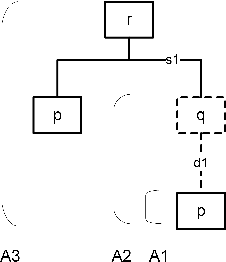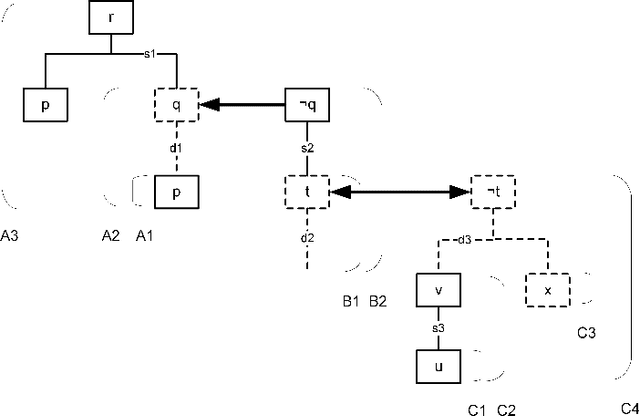Henry Prakken
Defending the Hierarchical Result Models of Precedential Constraint
Dec 15, 2025Abstract:In recent years, hierarchical case-based-reasoning models of precedential constraint have been proposed. In various papers, Trevor Bench-Capon criticised these models on the grounds that they would give incorrect outcomes in some cases. In particular, the models would not account for the possibility that intermediate factors are established with different strengths by different base-level factors. In this paper we respond to these criticisms for van Woerkom's result-based hierarchical models. We argue that in some examples Bench-Capon seems to interpret intermediate factors as dimensions, and that applying van Woerkom's dimension-based version of the hierarchical result model to these examples avoids Bench-Capon's criticisms.
A Comparative Study of Some Central Notions of ASPIC+ and DeLP
Sep 11, 2019

Abstract:This paper formally compares some central notions from two well-known formalisms for rule-based argumentation, DeLP and ASPIC+. The comparisons especially focus on intuitive adequacy and inter-translatability, consistency, and closure properties. As for differences in the definitions of arguments and attack, it turns out that DeLP's definitions are intuitively appealing but that they may not fully comply with Caminada and Amgoud's rationality postulates of strict closure and indirect consistency. For some special cases, the DeLP definitions are shown to fare better than ASPIC+. Next, it is argued that there are reasons to consider a variant of DeLP with grounded semantics, since in some examples its current notion of warrant arguably has counterintuitive consequences and may lead to sets of warranted arguments that are not admissible. Finally, under some minimality and consistency assumptions on ASPIC+ arguments, a one-to-many correspondence between ASPIC+ arguments and DeLP arguments is identified in such a way that if the DeLP warranting procedure is changed to grounded semantics, then DeLP notion of warrant and ASPIC+'s notion of justification are equivalent. This result is proven for three alternative definitions of attack.
A General Account of Argumentation with Preferences
Apr 18, 2018

Abstract:This paper builds on the recent ASPIC+ formalism, to develop a general framework for argumentation with preferences. We motivate a revised definition of conflict free sets of arguments, adapt ASPIC+ to accommodate a broader range of instantiating logics, and show that under some assumptions, the resulting framework satisfies key properties and rationality postulates. We then show that the generalised framework accommodates Tarskian logic instantiations extended with preferences, and then study instantiations of the framework by classical logic approaches to argumentation. We conclude by arguing that ASPIC+'s modelling of defeasible inference rules further testifies to the generality of the framework, and then examine and counter recent critiques of Dung's framework and its extensions to accommodate preferences.
* This paper contains correction to errors in the original paper which appears in the journal Artificial Intelligence
Intuitions and the modelling of defeasible reasoning: some case studies
Jul 09, 2002
Abstract:The purpose of this paper is to address some criticisms recently raised by John Horty in two articles against the validity of two commonly accepted defeasible reasoning patterns, viz. reinstatement and floating conclusions. I shall argue that Horty's counterexamples, although they significantly raise our understanding of these reasoning patterns, do not show their invalidity. Some of them reflect patterns which, if made explicit in the formalisation, avoid the unwanted inference without having to give up the criticised inference principles. Other examples seem to involve hidden assumptions about the specific problem which, if made explicit, are nothing but extra information that defeat the defeasible inference. These considerations will be put in a wider perspective by reflecting on the nature of defeasible reasoning principles as principles of justified acceptance rather than `real' logical inference.
 Add to Chrome
Add to Chrome Add to Firefox
Add to Firefox Add to Edge
Add to Edge